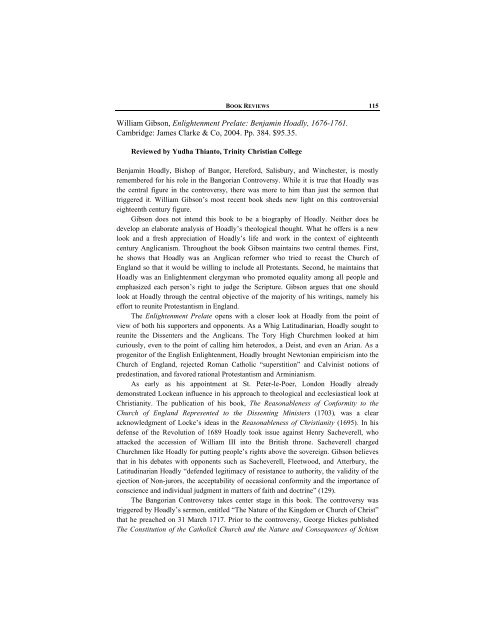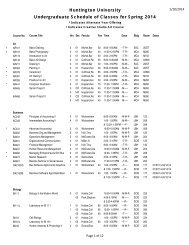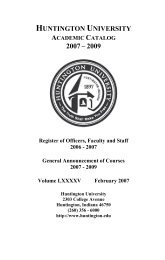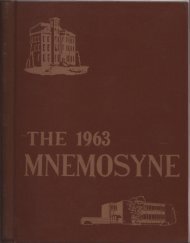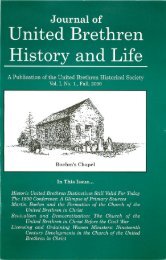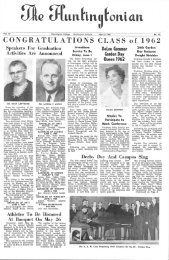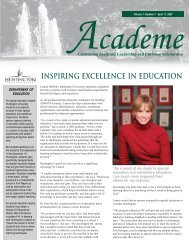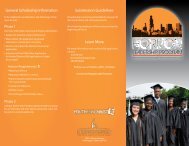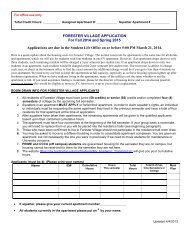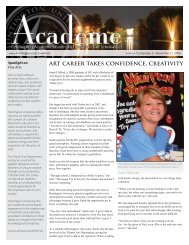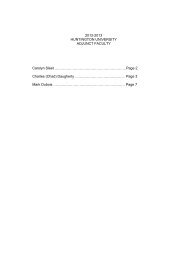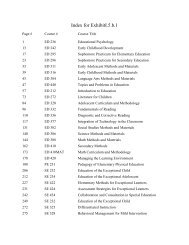Gillian Clark, Christianity and Roman Society - Huntington University
Gillian Clark, Christianity and Roman Society - Huntington University
Gillian Clark, Christianity and Roman Society - Huntington University
Create successful ePaper yourself
Turn your PDF publications into a flip-book with our unique Google optimized e-Paper software.
BOOK REVIEWS 115<br />
William Gibson, Enlightenment Prelate: Benjamin Hoadly, 1676-1761.<br />
Cambridge: James <strong>Clark</strong>e & Co, 2004. Pp. 384. $95.35.<br />
Reviewed by Yudha Thianto, Trinity Christian College<br />
Benjamin Hoadly, Bishop of Bangor, Hereford, Salisbury, <strong>and</strong> Winchester, is mostly<br />
remembered for his role in the Bangorian Controversy. While it is true that Hoadly was<br />
the central figure in the controversy, there was more to him than just the sermon that<br />
triggered it. William Gibson’s most recent book sheds new light on this controversial<br />
eighteenth century figure.<br />
Gibson does not intend this book to be a biography of Hoadly. Neither does he<br />
develop an elaborate analysis of Hoadly’s theological thought. What he offers is a new<br />
look <strong>and</strong> a fresh appreciation of Hoadly’s life <strong>and</strong> work in the context of eighteenth<br />
century Anglicanism. Throughout the book Gibson maintains two central themes. First,<br />
he shows that Hoadly was an Anglican reformer who tried to recast the Church of<br />
Engl<strong>and</strong> so that it would be willing to include all Protestants. Second, he maintains that<br />
Hoadly was an Enlightenment clergyman who promoted equality among all people <strong>and</strong><br />
emphasized each person’s right to judge the Scripture. Gibson argues that one should<br />
look at Hoadly through the central objective of the majority of his writings, namely his<br />
effort to reunite Protestantism in Engl<strong>and</strong>.<br />
The Enlightenment Prelate opens with a closer look at Hoadly from the point of<br />
view of both his supporters <strong>and</strong> opponents. As a Whig Latitudinarian, Hoadly sought to<br />
reunite the Dissenters <strong>and</strong> the Anglicans. The Tory High Churchmen looked at him<br />
curiously, even to the point of calling him heterodox, a Deist, <strong>and</strong> even an Arian. As a<br />
progenitor of the English Enlightenment, Hoadly brought Newtonian empiricism into the<br />
Church of Engl<strong>and</strong>, rejected <strong>Roman</strong> Catholic “superstition” <strong>and</strong> Calvinist notions of<br />
predestination, <strong>and</strong> favored rational Protestantism <strong>and</strong> Arminianism.<br />
As early as his appointment at St. Peter-le-Poer, London Hoadly already<br />
demonstrated Lockean influence in his approach to theological <strong>and</strong> ecclesiastical look at<br />
<strong>Christianity</strong>. The publication of his book, The Reasonableness of Conformity to the<br />
Church of Engl<strong>and</strong> Represented to the Dissenting Ministers (1703), was a clear<br />
acknowledgment of Locke’s ideas in the Reasonableness of <strong>Christianity</strong> (1695). In his<br />
defense of the Revolution of 1689 Hoadly took issue against Henry Sacheverell, who<br />
attacked the accession of William III into the British throne. Sacheverell charged<br />
Churchmen like Hoadly for putting people’s rights above the sovereign. Gibson believes<br />
that in his debates with opponents such as Sacheverell, Fleetwood, <strong>and</strong> Atterbury, the<br />
Latitudinarian Hoadly “defended legitimacy of resistance to authority, the validity of the<br />
ejection of Non-jurors, the acceptability of occasional conformity <strong>and</strong> the importance of<br />
conscience <strong>and</strong> individual judgment in matters of faith <strong>and</strong> doctrine” (129).<br />
The Bangorian Controversy takes center stage in this book. The controversy was<br />
triggered by Hoadly’s sermon, entitled “The Nature of the Kingdom or Church of Christ”<br />
that he preached on 31 March 1717. Prior to the controversy, George Hickes published<br />
The Constitution of the Catholick Church <strong>and</strong> the Nature <strong>and</strong> Consequences of Schism


